Investigative Journalism under attack
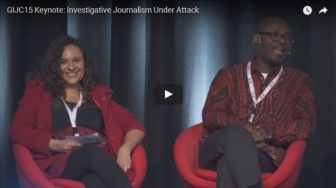 Reporting in many countries is getting more dangerous than ever. Journalists are increasingly harassed and arrested and independent media closed. Even family members of reporters are being arrested, for instance in Azerbaijan and Central Asia. In this panel, five courageous investigative reporters from four continents talk about their harrowing experiences with prosecutions, dirty tricks, and violent attacks. But more than that, they will show that intimidation does not work. All still continue to tell the stories that need to be told. From Mexico to Pakistan, Angola to Malaysia, reporters refuse to be silenced, despite facing kidnappings, death threats, beatings, imprisonment, and harassment.
Reporting in many countries is getting more dangerous than ever. Journalists are increasingly harassed and arrested and independent media closed. Even family members of reporters are being arrested, for instance in Azerbaijan and Central Asia. In this panel, five courageous investigative reporters from four continents talk about their harrowing experiences with prosecutions, dirty tricks, and violent attacks. But more than that, they will show that intimidation does not work. All still continue to tell the stories that need to be told. From Mexico to Pakistan, Angola to Malaysia, reporters refuse to be silenced, despite facing kidnappings, death threats, beatings, imprisonment, and harassment.
How to investigate a bank – Swiss Leaks
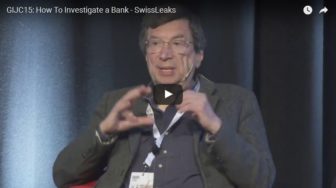 Here’s the inside story of a collaborative investigation that exposed how the Swiss branch of one of the world’s biggest banks, HSBC, profited from doing business with tax dodgers and criminals around the world. Team members talk about how they reconstructed and mined the leaked financial data to find the patterns of wrongdoing that made headlines around the world and triggered official inquiries in several countries. Also: why the French journalists who obtained the files decided to share them with colleagues around the world rather than have their own scoop.
Here’s the inside story of a collaborative investigation that exposed how the Swiss branch of one of the world’s biggest banks, HSBC, profited from doing business with tax dodgers and criminals around the world. Team members talk about how they reconstructed and mined the leaked financial data to find the patterns of wrongdoing that made headlines around the world and triggered official inquiries in several countries. Also: why the French journalists who obtained the files decided to share them with colleagues around the world rather than have their own scoop.
The Migrant files
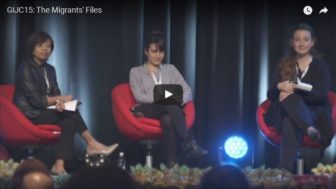 “The Migrants’ Files” is a consortium of journalists from over 15 European countries. It is coordinated by Journalism++, and is focused on examing the human and financial cost of 15 years of “Fortress Europe.” Award-winning filmmaker Firas Fayyad was twice held by Syrian President Bashar Assad’s fearful intelligence regime for exposing human rights abuses and covering the start of the 2011 “peaceful protests” that turned into civil war. Fayyad offers tips to foreign journalists investigating the trail of Europe’s biggest immigration crisis in decades.
“The Migrants’ Files” is a consortium of journalists from over 15 European countries. It is coordinated by Journalism++, and is focused on examing the human and financial cost of 15 years of “Fortress Europe.” Award-winning filmmaker Firas Fayyad was twice held by Syrian President Bashar Assad’s fearful intelligence regime for exposing human rights abuses and covering the start of the 2011 “peaceful protests” that turned into civil war. Fayyad offers tips to foreign journalists investigating the trail of Europe’s biggest immigration crisis in decades.
Investigating environmental crime: Illegal logging
 From the Amazon to the Transylvanian forest: What are the best ways to investigate illegal deforestation today? This panel will take you through the growing capability of satellite imagery at Skybox and other service providers, combined with and advanced “follow the money” and other reporting techniques.
From the Amazon to the Transylvanian forest: What are the best ways to investigate illegal deforestation today? This panel will take you through the growing capability of satellite imagery at Skybox and other service providers, combined with and advanced “follow the money” and other reporting techniques.
Reporting on organized crime
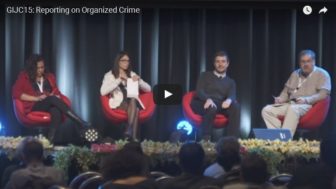 Most people think of Hollywood bad guys like Robert DeNiro or Joe Pesci when they think of organized crime. In reality, organized crime is a $2 trillion global business that ties government, business and criminals together. Understanding how organized crime works today is important to seeing its influence in your country. Learn about the latest trends in organized crime and how it is changing its face and blending even more seamlessly into politics and the financial industry.
Most people think of Hollywood bad guys like Robert DeNiro or Joe Pesci when they think of organized crime. In reality, organized crime is a $2 trillion global business that ties government, business and criminals together. Understanding how organized crime works today is important to seeing its influence in your country. Learn about the latest trends in organized crime and how it is changing its face and blending even more seamlessly into politics and the financial industry.
Revealing Kremlin money
 Stephen Grey (UK) and Roman Anin (Russia) set up a multinational team at Reuters to discover the money trail from the taxpayer to Putin’s friends. By combining multiple strategies of data journalism and field research, combing through customs records, corporate archives and the full data-set of two entire Moscow banks, they uncovered billions of dollars of suspicious money flows. www.reuters.com/investigates/section/comrade-capitalism/ )
Stephen Grey (UK) and Roman Anin (Russia) set up a multinational team at Reuters to discover the money trail from the taxpayer to Putin’s friends. By combining multiple strategies of data journalism and field research, combing through customs records, corporate archives and the full data-set of two entire Moscow banks, they uncovered billions of dollars of suspicious money flows. www.reuters.com/investigates/section/comrade-capitalism/ )
How to investigate the world bank
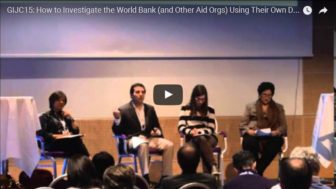 ICIJ’s Evicted & Abandoned investigation revealed the hidden toll of projects financed by the planet’s best-known development lender: the World Bank. Over the last decade, projects funded by the bank have cost 3.4 million people their homes, part of their land, or some of their livelihoods, while the bank has regularly violated its own rules for protecting these vulnerable populations.
ICIJ’s Evicted & Abandoned investigation revealed the hidden toll of projects financed by the planet’s best-known development lender: the World Bank. Over the last decade, projects funded by the bank have cost 3.4 million people their homes, part of their land, or some of their livelihoods, while the bank has regularly violated its own rules for protecting these vulnerable populations.
Covering China: Tips and best Practices
 China is now the world’s second largest economy and its actions affect the world. The People’s Republic poses unique challenges for investigative journalists. Here are three perspectives from veteran journalists both inside and outside of China. Liu Yiman of Southern Weekly recently won China’s Reporter of the Year for her coverage of the envrionment. Zhou Wei, a BBC producer in Beijing, has won praise for her investigations into government corruption. And the Financial Times’ Christine Spolar led a data-driven investigation into stock manipulation involving Chinese solar company Hanergy, using reporters in Hong Kong, China and London.
China is now the world’s second largest economy and its actions affect the world. The People’s Republic poses unique challenges for investigative journalists. Here are three perspectives from veteran journalists both inside and outside of China. Liu Yiman of Southern Weekly recently won China’s Reporter of the Year for her coverage of the envrionment. Zhou Wei, a BBC producer in Beijing, has won praise for her investigations into government corruption. And the Financial Times’ Christine Spolar led a data-driven investigation into stock manipulation involving Chinese solar company Hanergy, using reporters in Hong Kong, China and London.
